Why AI-Driven Product Demos Are The Future Of SaaS Sales
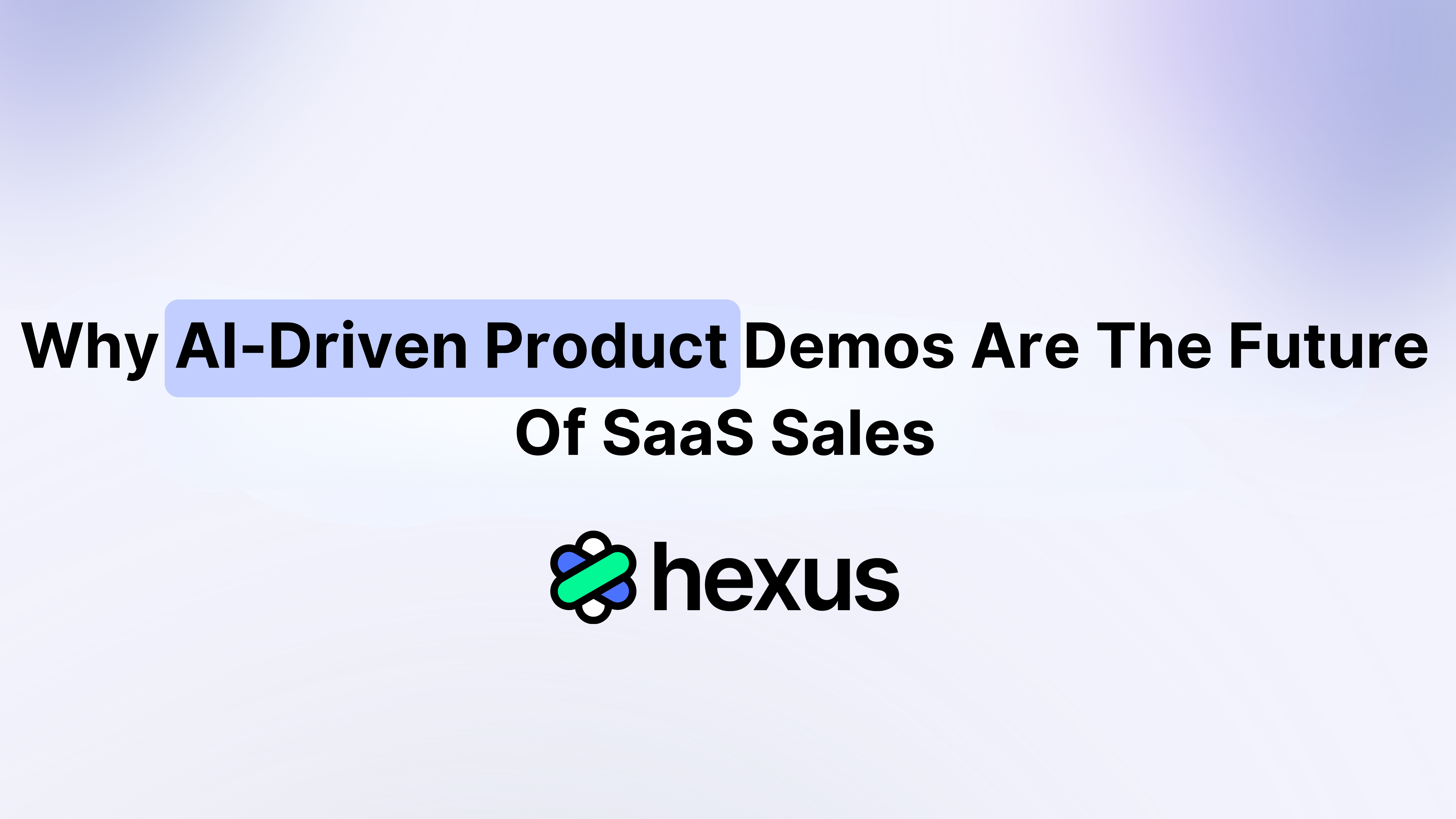
Introduction: The New Age of SaaS Sales
The SaaS market has evolved significantly in the last decade. With thousands of solutions for almost every business requirement, competition is tougher than ever. SaaS customers of today are better-informed, choosier, and more demanding when analyzing software. They don't need bland presentations and roundabout discussions with sales teams. They want to see value immediately.
This transformation has given birth to AI-driven product demos, a revolutionary strategy that merges personalization, automation, and intelligence to create customer-oriented buying experiences. In contrast to stagnant demos or lengthy discovery calls, AI-driven demos offer customized, interactive, and scalable product presentations that are attuned to every buyer's distinct requirements.
As more SaaS businesses embrace product-led growth (PLG) initiatives, AI-powered demos are now the foundation of new-age sales and marketing. Not only do they highlight products, but they also hasten conversions, reduce sales cycles, and offer data-based insights that enable teams to close more deals.
What Are AI-Powered Product Demos?
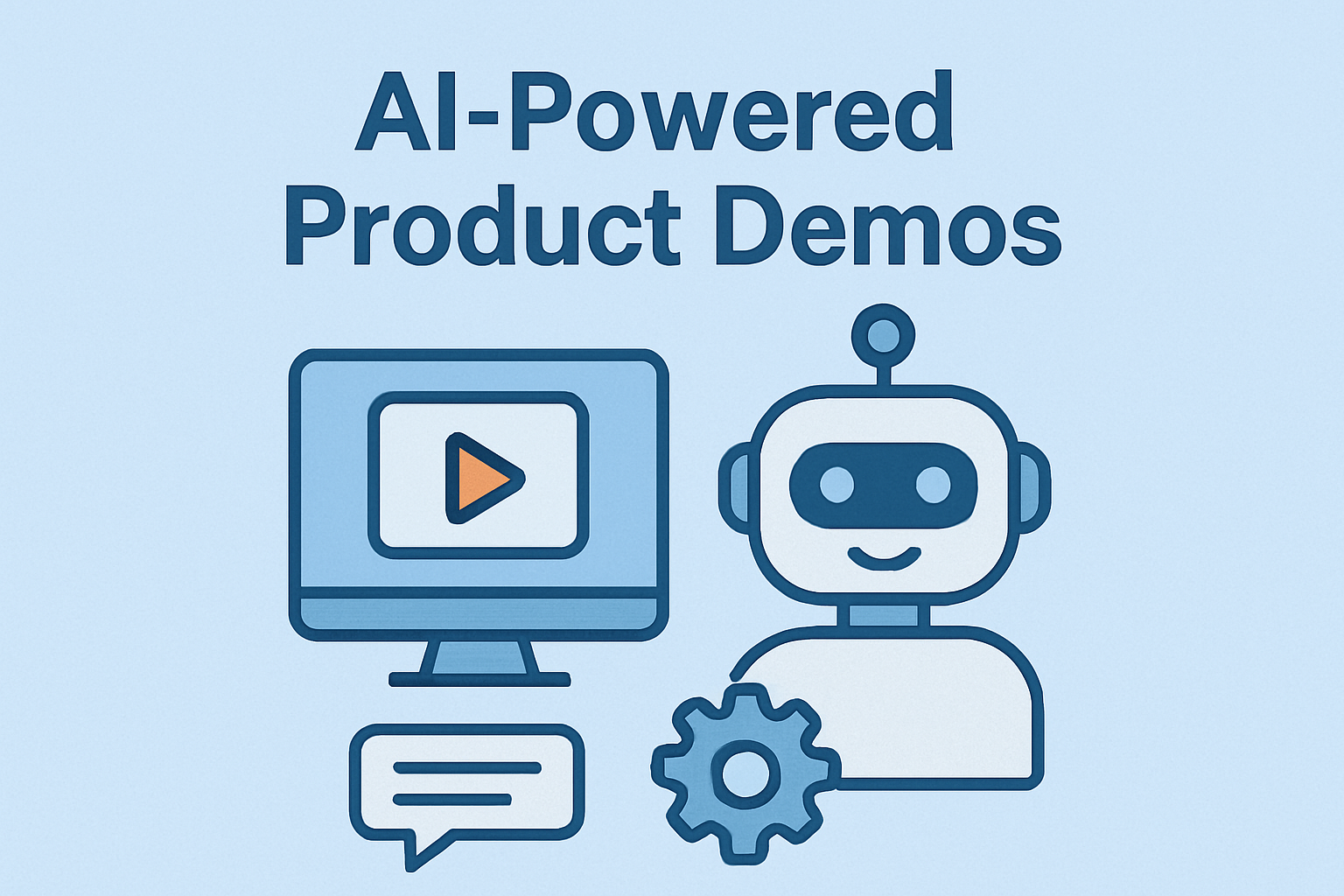
At their foundation, product demos powered by AI are smart, automated presentations of software products that leverage artificial intelligence to tailor and refine the buyer experience.
Rather than a "one-size-fits-all" demonstration, AI-based solutions adapt in real-time according to considerations such as:
- Prospect's industry or business size
- Buyer profile or job function (CFO, marketer, engineer, etc.)
- Pain points and objectives determined in discovery
- Feature preferences or interactions within the demo
That is, a financial analyst might be shown enhanced reporting and compliance aspects first, while a marketing manager is shown the automation and campaign tracking capabilities first.
With AI at the forefront, these demos turn into dynamic, interactive experiences—much more engaging and effective than static screen shares or pre-recorded tours.
Why Traditional Demos Are No Longer Enough
Years ago, SaaS sales came down to live demo calls where sales reps guided prospects through a product. Although good in certain situations, this methodology has significant drawbacks:
- Time-Consuming – Sales reps invest hours preparing, tailoring, and delivering demos for each lead.
- Generic Experience – Most demos are generic, demonstrating features that don't apply to the buyer.
- Limited Scalability – A human process cannot scale cost-effectively to hundreds or thousands of prospects.
- Lack of Insights – Legacy demos miss rich behavioral insights on how prospects interact with the product.
- Buyer Frustration – Buyers today like self-serve, on-demand discovery rather than waiting for a rep to find time to call.
In the current SaaS world, where customers are 70% of the way to making a decision before they even talk to sales, ancient demo models just can't hold up.
How AI-Powered Product Demos Revolutionize SaaS Sales
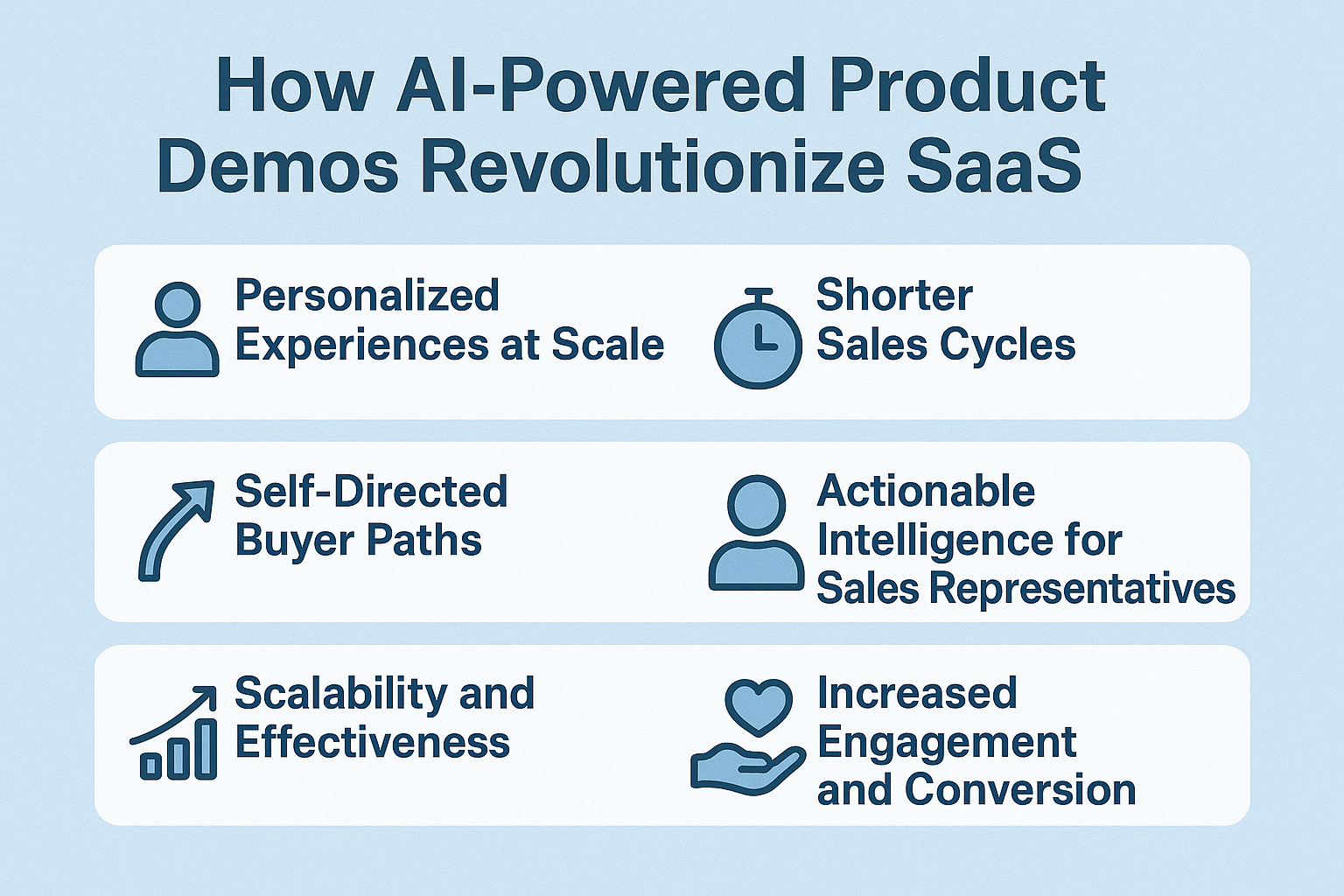
- Personalized Experiences at Scale
Artificial intelligence processes information regarding prospects—e.g., industry, company size, role, or previous interactions—to automatically personalize demos. This allows each buyer to see the most applicable features so the demo feels specially crafted for them without the need for manual configuration.
- Shorter Sales Cycles
Prospects make quicker decisions when they recognize immediate value. Product demos powered by AI eliminate unnecessary steps in the sales process, shaving first touch to closed deal time.
- Self-Directed Buyer Paths
Buyers can view the demo at their convenience—whether that's on a workday afternoon, late evening, or on the weekend. This self-serve model is the new expectation of instant access.
- Actionable Intelligence for Sales Representatives
AI follows each click, scroll, and engagement in the demo. This information shows what matters most to buyers, giving sales representatives a guide for customized follow-ups.
- Scalability and Effectiveness
With AI doing the heavy lifting, SaaS businesses can execute thousands of demos in parallel without burning out sales teams. This is particularly useful for startups and high-growth SaaS companies.
- Increased Engagement and Conversion
Interactive, AI-based demos are much more captivating than text-based presentations. When prospects engage with an active demo, they're likely to recall the product and appreciate its worth—resulting in increased conversion rates.
Comparing AI-Powered Demos to Legacy SaaS Sales Tools
Let's compare AI-powered demos and legacy SaaS demo models to get an idea of their real worth:
By comparing these two options, the difference is evident: AI-powered product demos remove friction from the buyer journey and increase efficiency for SaaS teams.
Why Hexus Stands Out: A Look at Its Core Services
AI-Driven Demo & Content Generation
With Hexus, both interactive guides and product demos, videos, and blog posts can be effortlessly created within minutes, no coding or design expertise required. Its AI Studio also enables the efficient generation and repurposing of content.
Self-Guided Product Tours
Create product self-guided tours complete with clickable hotspots and multi-step processes and CTAs. Your prospects can explore your product at the pace of their preference, thus giving a memorable and customized product experience.
Demo Hub
Place all your tutorials and demos in a single, branded, and centralized hub. This makes it easier for teams to tailor the Demo Hubs for specific groups of users and easier discovery with advanced search and filters.
Refurbish and Modify Videos
Turn your existing videos or recordings into interactive demos. Keep in mind that instead of redoing the entire demo, you simply need to modify the parts that are relevant.
Refined Editing Features
Create voiceovers, avatars, and polished flows; split steps, highlights, and insert flows; blur sensitive data; and add polished splits to demo flows. Maintain brand adherence with refined features and reduce hours of manual work.
Metrics & Reporting
Monitor engagement—identify viewers of your demos, how long they remained, and the demo steps they engaged with. Such data is valuable for lead qualification and enhancing conversion rates.
Effortless Integration
Integrate with HubSpot for lead capturing, Google Analytics for performance monitoring, and GitBook for inserting product demos directly into the documentation.
Multiple Departments
- Sales: Distribute customized follow-up demos and accelerate deal closure.
- Marketing: Use product demos in emails, landing pages, and other lead generation campaigns.
- Customer Success: Develop onboarding sequences and reduce support-request tutorials.
How AI-Powered Product Demos Work Within the SaaS Sales Funnel
AI-powered demos can be inserted at various levels of the SaaS funnel:
Top of the Funnel (Awareness)
- Interactive demos within landing pages engage prospects and demonstrate value immediately.
- AI is employed by marketing teams to segment audiences and deliver customized demo experiences.
Middle of the Funnel (Consideration)
- Self-guided demos are given to prospects that feature aspects applicable to their business.
- Sales representatives are provided with insights on user behavior, tracking purchasing intent early on.
Bottom of the Funnel (Decision)
- Demos also provide proof of value, lessening the need for time-consuming POCs (Proof of Concepts).
- AI-driven insights allow for highly customized closing pitches.
By snuggling up throughout the funnel, AI-powered product demos deliver uniform, personalized experiences that boost conversions at all points.
Trend Highlights That Will Revolutionize AI-Powered Product Demos
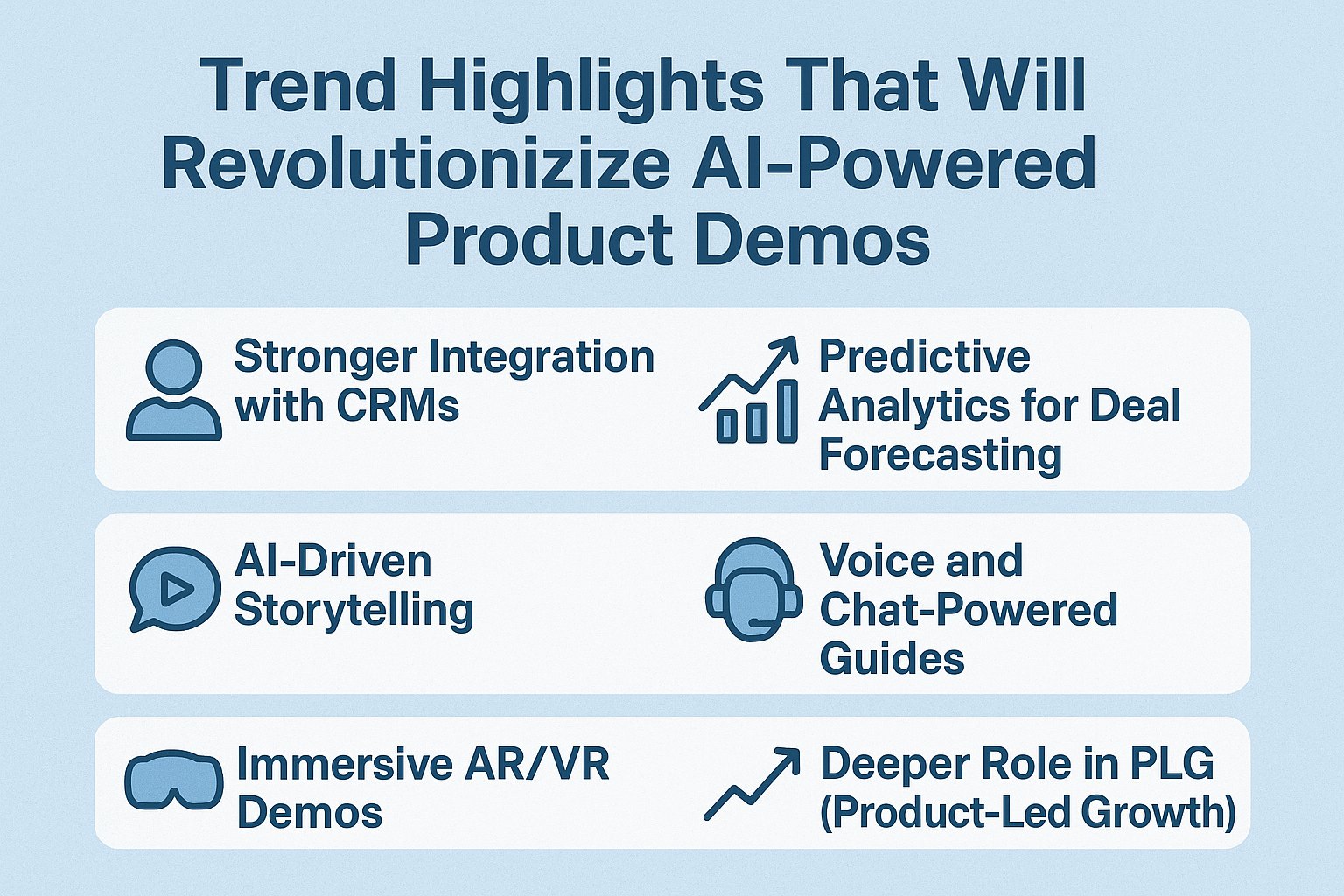
- Stronger Integration with CRMs
Future demoing will integrate strongly into software like Salesforce, HubSpot, and Zoho CRM, enabling sales reps to access real-time demo analytics within their workflows.
- Predictive Analytics for Deal Forecasting
AI won't just customize demos but also forecast which prospects have the greatest chance of converting based on demo usage data—assisting sales teams in prioritizing efforts.
- AI-Driven Storytelling
Demos will no longer be static flows but will tell stories dynamically based on prospect interaction—basically, a Netflix-style recommendation system for product features.
- Voice and Chat-Powered Guides
Envision a demo in which an AI assistant responds to questions in real-time, showing the prospect to relevant features directly. This conversational interface will revolutionize engagement.
- Immersive AR/VR Demos
As SaaS products grow more intricate, AR and VR-driven demos will make it possible for buyers to interact with software in a 3D, immersive space.
- Deeper Role in PLG (Product-Led Growth)
With PLG ruling SaaS approaches, AI-powered demos will be the go-to onboarding path for customers, taking over from conventional free trials that tend to involve setup.
AI-Powered Demos in the Context of Product-Led Growth (PLG)
The SaaS universe is adopting product-led growth—a framework where the product itself is the leading force behind customer acquisition, retention, and expansion.
In PLG, customers wish to "try before they buy." They don't need promises—they need proof. AI-driven demos perfectly resonate with this behavior by:
- Enabling instant access to the product without lengthy onboarding.
- Providing tailored, trial-like experiences from the outset.
- Demonstrating value-driven use cases instead of generic features.
This not only establishes trust but speeds up adoption by allowing customers to feel the impact of the product firsthand.
Key Benefits of AI-Powered Product Demos
1. For Sales Teams
- Save time on tedious demo prep.
- Emphasize high-value discussions rather than boilerplate walkthroughs.
- Obtain actionable intelligence on buyer behavior.
2. For Marketing Teams
- Design engaging demo campaigns that capture and qualify leads.
- Provide personalized experiences at the top of the funnel.
- Gather valuable engagement data to optimize messaging.
3. For Buyers
- Get on-demand access to personalized demos.
- Play products freely without sales pressure.
- Make quicker, better-informed buying decisions.
Real-World Example: How SaaS Companies Use AI-Powered Demos
Imagine a SaaS business selling project management software. Rather than presenting each prospect with the same generic demo, AI customizes the experience:
- A construction manager views project schedules, resource planning, and compliance monitoring.
- A marketing executive views campaign workflows, team collaboration tools, and budget reporting.
- A startup founder views cost savings, scalability, and integration advantages.
This kind of personalization creates instant relevance, so prospects feel the product was made for them.
Challenges and Considerations
Though AI-driven demos are the way forward, SaaS firms need to address some considerations:
- Implementation Costs – Sophisticated AI demo platforms demand initial investment.
- Integration Needs – Integration of demo software with CRM, analytics, and marketing tools is important for maximum impact.
- Content Strategy – Firms need to ensure that demo flows resonate with their buyer personas and use cases.
- Change Management – A transition from human-conducted demos to AI-conducted experiences can involve internal training and process refreshes.
But these challenges pale in comparison to the long-term advantages of scalability, efficiency, and better customer experience.
Final Thoughts
The SaaS universe is headed toward an era of personalization, velocity, and buyer independence as drivers of success. Conventional demo strategies can't keep pace with the needs of today's buyers.
AI-driven product demos fill the gap by providing:
- Personalized, scalable buyer experiences
- Actionable insights for sales and marketing teams
- Increased conversion rates and shorter sales cycles
- For SaaS companies, adopting AI in product demos is not a nicety, but a necessity for growth, differentiation, and long-term success.
The future of SaaS selling isn't about displaying all the features. It's about displaying the right value to the right person at the right time. And AI is making that possible at scale.
The Future of SaaS Sales with AI-Powered Product Demos
The evolution of SaaS sales is clear: the future is intelligent, personalized, and product-driven. AI-powered product demos are not just a trend—they’re becoming a necessity for SaaS companies looking to stay competitive in crowded markets.
As artificial intelligence continues to advance, future demos will likely include:
- Voice-based AI guides that walk users through features.
- Predictive personalization that anticipates buyer needs.
- AR/VR-powered demos for immersive product experiences.
- Deeper insights to identify the likelihood of conversion with high precision.
Firms embracing AI-powered demo solutions today will not just win more deals today but future-proof their sales approach for tomorrow as well.
Conclusion
In a world where SaaS buyers expect speed, customization, and autonomy, old-school demo techniques do not cut it. Product demos powered by AI fill the gap by providing customized, scalable, and highly interactive experiences that match new buyer expectations.
By integrating product-led growth initiatives and empowering sales teams with compelling insights, these demos are defining the future of SaaS sales. For businesses wishing to differentiate themselves, embracing AI-driven demos isn't a choice—it's a competitive requirement.

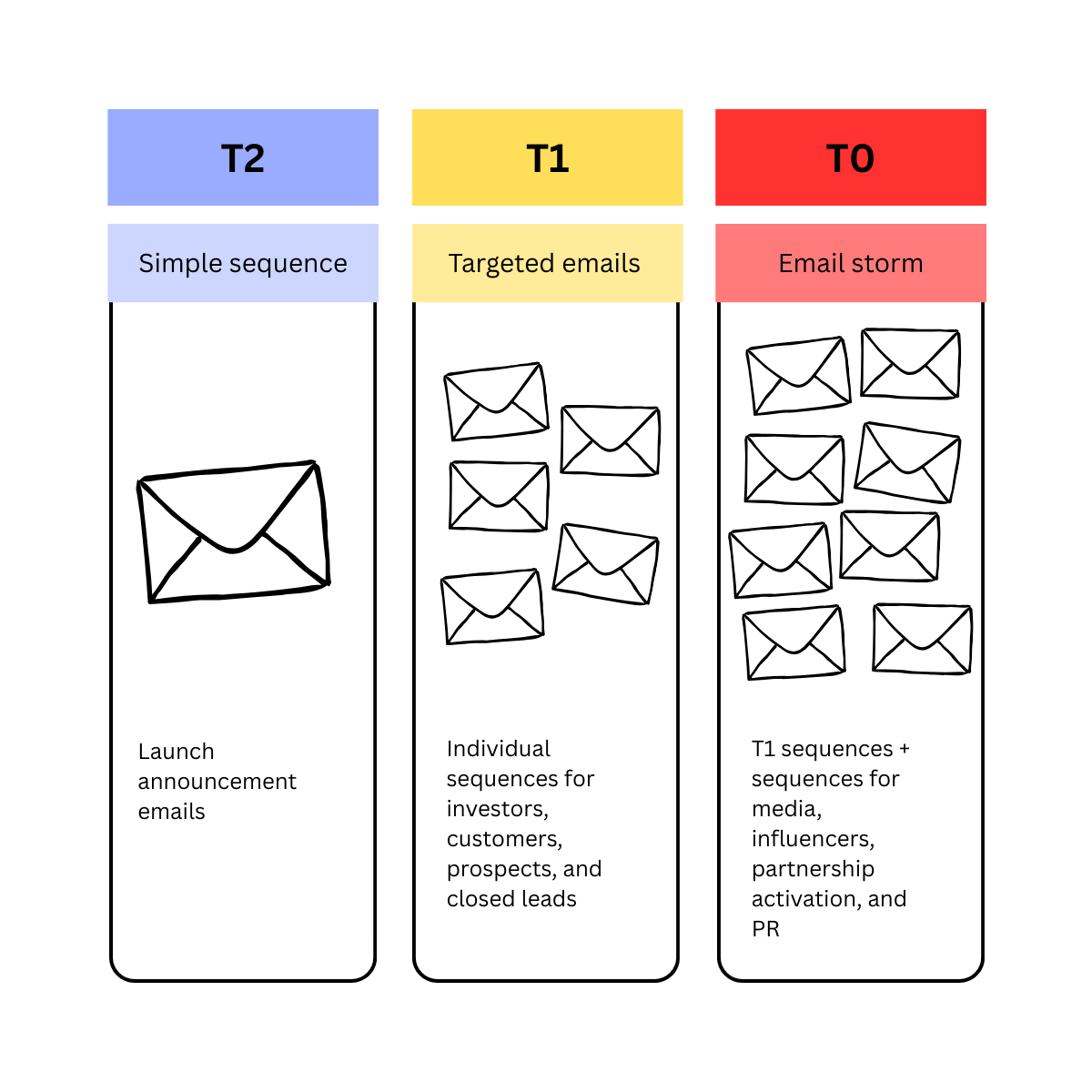
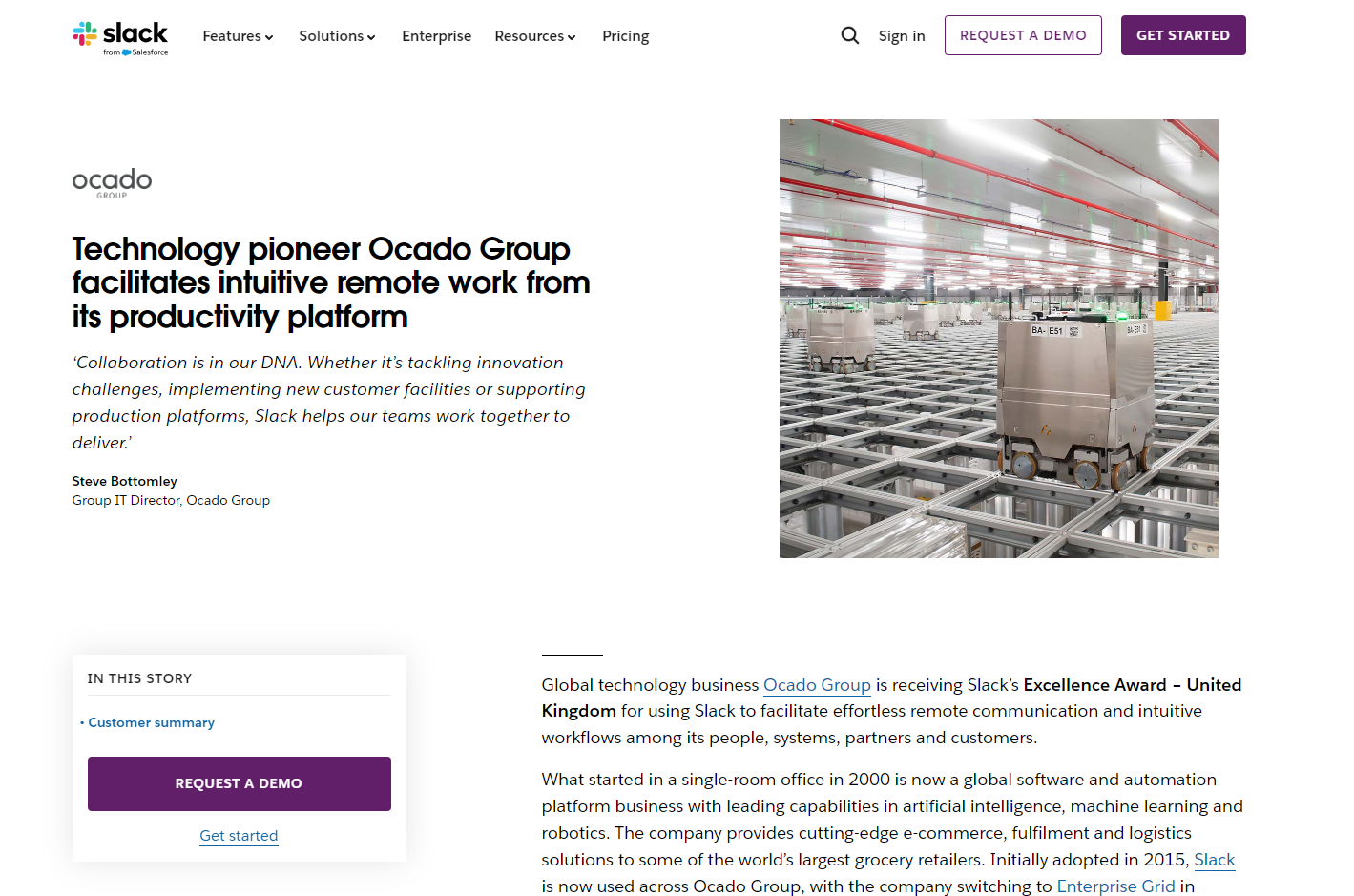
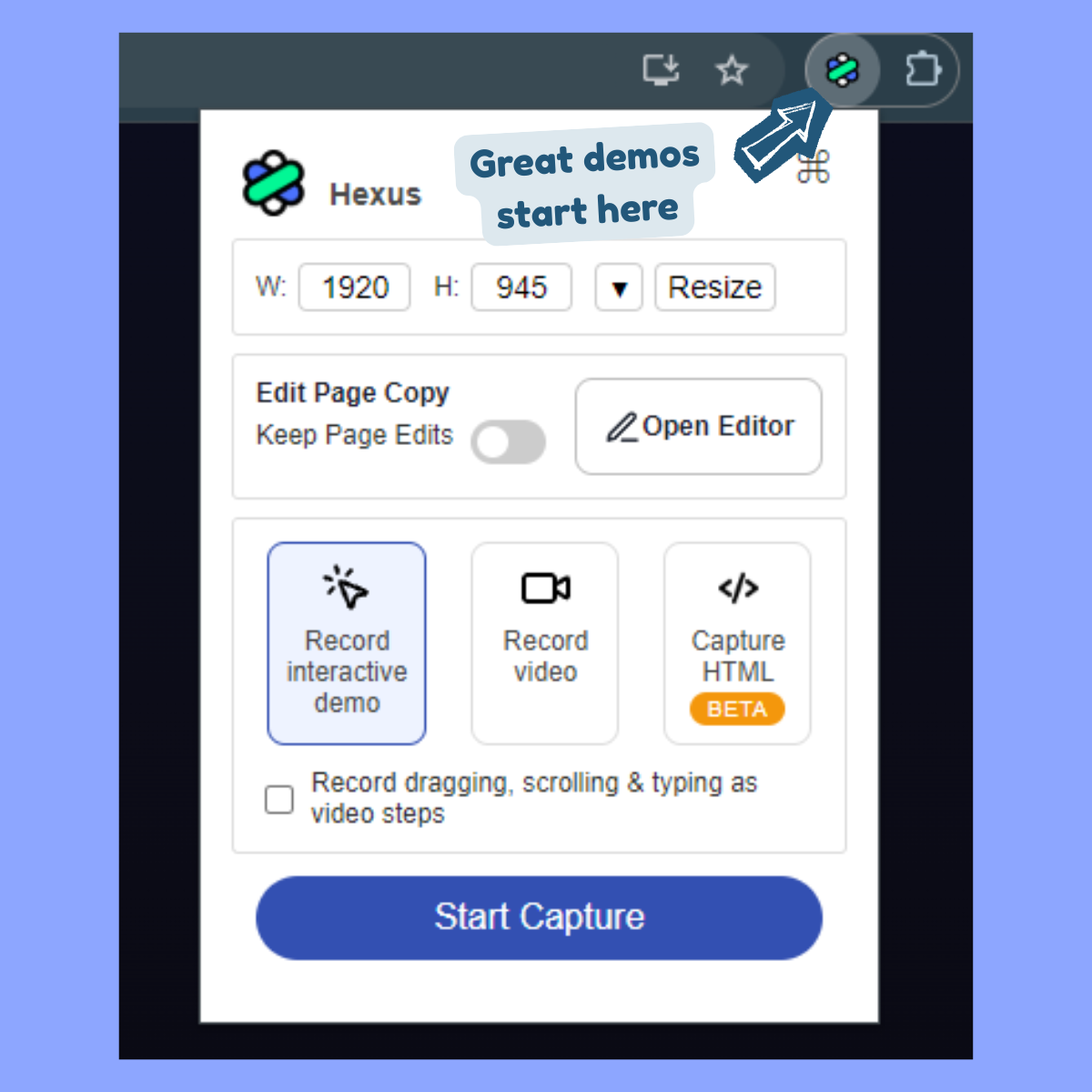

.png)

.png)